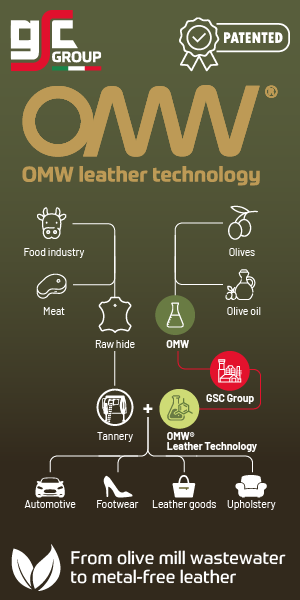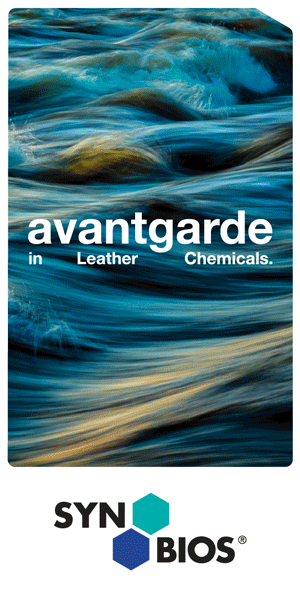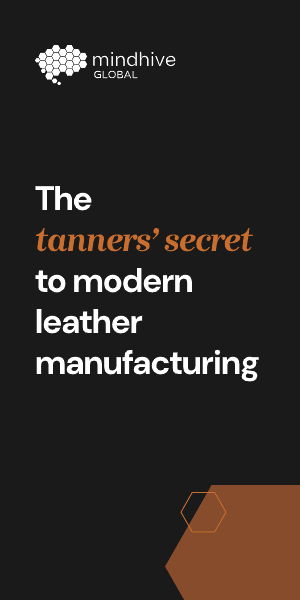The globalised leather industry is here to stay

Italy’s national tanning industry association, UNIC, elected Fabrizio Nuti as its new president at the end of 2020. Based in Santa Croce sull’Arno in Tuscany, Mr Nuti runs the business founded by his father, Ivo Nuti, in 1955. It now comprises the Nuti Ivo, Lloyd, Everest, Papete and Deluxe tanneries in Italy and also has partnerships in Paraguay, Morocco and Hong Kong.
You said recently that there is a need for continuous improvement in sustainability, but that leather manufacturers in Italy have had sustainability as a priority for decades. To what extent has this focus on sustainability helped Italy’s tanning sector become successful?
One of the reasons why sustainability has been a priority for the Italian tanning industry for decades derives from having always been organised in districts. The relationship with the local area has always been of fundamental importance to our companies. The first tanning wastewater treatment plant was created in the 1960s in Lombardy, in the district of Turbigo. This happened a few years before the first environmental regulation law was enacted in Italy.
This fact shows that Italian tanneries have been committed for many years now to minimising the environmental impact of production. It has been one of the keys to the success of Italian leather because selling a clean product that is the result of a healthy and transparent process has always been positively perceived by customers. They can add this element to other rewarding factors, such as style and technical performance. If previously sustainability was an intrinsic, positive feature in the product, this aspect is sought after in a more direct way now and with greater force.
If, in a discussion with UNIC, a member company questioned the return it might gain from investing in sustainability, what would you say to convince them the investment was worthwhile?
I would explain that an investment of this type is simply necessary if you want to develop your company in an efficient and successful way. Sustainability has become one of the elements that contribute to creating the overall quality of a leather product. Probably, at this moment in time, it is one of the main elements that make the quality of one product stand out compared to another. So, investing in sustainability means investing in the quality of your products and I would say that this type of investment always has a return.
To ask the same question in a slightly different way, how will a high level of excellence in sustainability help Italy’s leather manufacturers recover from the effects of the covid-19 pandemic? How will you convince brands that this is worth investing in? Are the brands listening? Some of them seem to prefer to make up their own stories around sustainability and don’t seem to care very much if these are based on truth or not.
In some respects, what you say is true. There are brands that address sustainability, or some aspects of sustainability, in a way that is a little too “personal” and subjective. Sometimes their messages seem not very open or logical compared to technical and scientific evidence. It also happens that the solutions some brands want to put in place to resolve an aspect of sustainability are, on the whole, worse than the initial problem. I think these are some of the consequences of this great shift of opinion in favour of sustainability. There are people and companies who approach it with the aim of making it almost exclusively a marketing vehicle and those who experience it as the only possible way of doing things right, without shortcuts, tricks or red herrings. For us, improvement in the area of sustainability must be concrete, technically measurable and related to every aspect of the business at an environmental, social and ethical level.
Your father, Ivo Nuti, was renowned as a visionary man, and moreover, as having a global vision for this industry, helping to create demand across the global luxury sector for leather made in Italy. Which aspect of the industry in the 2020s do you think would have surprised him?
The market has changed a lot since my father’s time. Customers have changed, relations with suppliers have changed, the pace and dynamic along the supply chain have changed, the very way of being a tanner and making leather has changed extensively. The tanning industry was a bit of a world apart in past years, while now it is a more open and well known subject. In terms of the market, perhaps he would not have expected this concentration of customers at the higher end of the market, where right now there are ten or maybe 20 brands competing with each other. I am sure he would not be surprised by the current focus on sustainability issues because he always considered it one of the drivers of the development of the sector.
What is your opinion of globalisation in the leather industry? Will it reduce in the post-covid world?
The leather supply chain has been deeply internationalised for decades and is now globalised, almost by nature. Hides, skins and leather, at every stage of the process, have always travelled between countries and continents and I am sure they will continue to do so. Indeed, they will do so more than before. Globalisation is an irreversible process because technological development is irreversible and, more and more, technology is helping us to eliminate distances and facilitate relations with any place on the planet. Covid, in some ways, has suspended the ease of movement but has accelerated the ability to relate at a distance. So it did not reduce globalisation but simply changed it temporarily.
UNIC president, Fabrizio Nuti, argues that improvements in sustainability must be concrete, measurable and related to every aspect of the business at an environmental, social and ethical level. Credit: UNIC





























